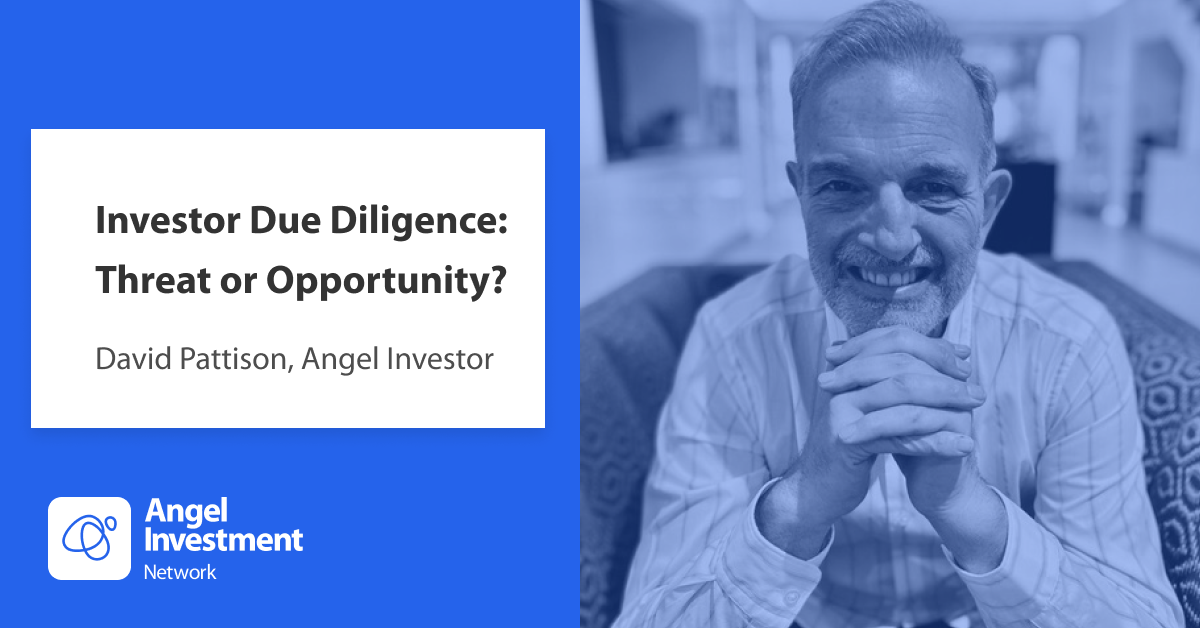In our latest guest post David Pattison, experienced angel investor, business leader and author, considers the thorny question of investor due diligence. Is it a threat or or an opportunity? Or a bit of both?
If you are trying to raise money, there will be a requirement for the company (and often the management) to go through a Due Diligence (DD) process. This is where the prospective investors will take a deeper look you and your business.
If the investors are individuals or angels then the DD can be quite light touch, usually involving an interrogation of the business plan, some conversations with the team and maybe some customers or current investors. If they are funds or institutions, then they will take an almost forensic look and ask you to provide a mountain of information.
This can cover Finance, Legal, Commercial, Tech, Management, Sales and Marketing, Security. IP etc. They are looking for weaknesses, threats to the business, problems and anything that could be vaguely called illegal. Almost all of this will be done by sector experts often employed externally.
It’s a tough and distracting process. My personal experiences and most businesses I have spoken to about this process show it to be exhausting and emotionally difficult.
So is DD a threat or an opportunity, or a bit of both? The answer is that it depends. It is largely driven by the type of investor. It can be a threat if they are obsessed with just protecting their money, then it can feel negative and can erode the future relationship. It can be an opportunity if they are looking to help to build the business and see the future health of the business as the key to their investment paying off. As they will use the DD to come up with recommendations on how to improve practices and processes.
Whatever type of investor you have, DD will be part of the investment process. Here are some things you can do to help yourself:
- Be well prepared.
A founder of a company I worked with always said ‘run your business as if you are always about to enter DD.’ Make sure you always know where all the documents are and be prepared to share everything. You will be asked to set up a data room with all the company information in it. Why not set this up from the start of your business? It’s a good discipline and shows good business practice. - Spread the load.
The CEO should not be the only source for DD. Spread it around the team. It shows confidence in the team and exposes the team to the investors. Have a DD data lead and if possible don’t make it the CEO. If they are a good team, then show them off. - DD is distracting.
Do not underestimate the amount of time it takes to get through the DD process. Often it can be three months or more. Almost every business I know suffers a drop in performance during this period, always because the team is distracted. Try to minimise the effect by being well prepared in advance. - Don’t be afraid to say no.
Investors can be lazy and will just ask for everything you have. If you think the information is not justified, then push back. - Set a time limit.
At the start of the process set a date for when no more information will be provided, and no more questions will be answered. Doing this will ensure that the deal keeps moving forward and the advisers/specialists employed by the investors will not be tempted to over justify their fees by dragging it on. - Do not lie or cover up in DD.
This is a forensic process and whatever you are trying to hide will be found. Good businesses with good practices should not be afraid of DD. Bad businesses should. - Just answer the questions.
Sometimes you don’t know the answer to a question, don’t try and tap dance your way through it. Just say you don’t know and then find out the answer. Sometimes a finding will surprise you. Be surprised and then find out why you are. - Do not get emotional.
This is the easiest thing to say and the hardest thing to do. You and your company will effectively be accused of all sorts of things. It can sound like you are a ‘fraudulent liar’ running an illegal money laundering crime syndicate (I am exaggerating a bit!). Unless you are then let it wash over you and try to explain why none of this is appropriate and here are the reasons why. Remember they are looking for weaknesses and that’s what they focus on. - If it’s not mentioned, you are probably doing it well.
It’s very rare in DD that you get congratulated for doing something well and if you are it is usually in passing and buried in the small print. Don’t look for a lot of ‘pats on the back’. If the investment happens that is usually the sign that you have a good business. - Investors become partners.
Try not to burn bridges with the people doing the investment. You will work with them after the investment is made, and friction early in the relationship rarely diminishes.
Two final things to remember about DD:
- Firstly, it is, in effect, an extended interview. Part of that interview will be the ‘quick cup of coffee’ or ‘meet for a drink’. Everything you say will be noted. It’s important that you and your team are aligned and have the same answers to the same questions.
- Secondly, DD is a two-way process. Ask the investor about their performance, who they work with. Talk to some of the companies they have invested in. Do your own DD and do not stop asking questions of them.
DD is hard and even if you are well prepared it is distracting and emotionally demanding. But it can make you a better business in the long run. Is DD a threat or an opportunity? A lot of it is up to you.
This is one of the many topics David covers in his book The Money Train: 10 Things young businesses need to know about investors. It’s a guide to preparing for the investment process from seed capital to Series A, with lots of real-world examples.


